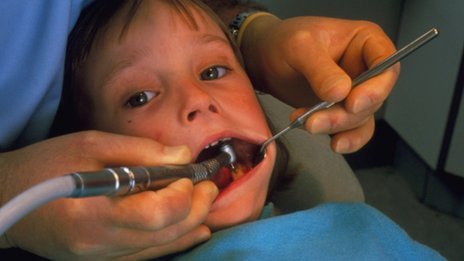
More than one in 10 three-year-olds have tooth decay, the first survey of the age group shows. Public Health England researchers checked the teeth of nearly 54,000 children at nurseries, children’s centres and playgroups.
They found 12% of children had evidence of tooth decay. These youngsters had an average of three teeth that were decayed, missing or filled. Large variations were found from place to place in the study.
In one area – Leicester – 34% of children had tooth decay whereas in others it was only 2%. Researchers also said that some children had a particular type of decay known as early childhood caries. This affects the upper front teeth and spreads quickly to other teeth. It is linked to the consumption of sugary drinks in baby bottles or sipping cups. PHE said that parents should give their children sugary foods and drinks in smaller quantities and less often. It also urged them not to add sugar to weaning foods or drinks.
Parents and carers should also start brushing children’s teeth as soon as the first tooth appeared and supervise their brushing until they the age of seven or eight, PHE said. Previous research by the organisation has shown that by the age of five, one in four children has tooth decay.
Anaesthetic
Sandra White, director of dental public health at PHE, said while there had been “significant improvements” in oral health over the years, the findings were worrying.
“Tooth decay is an entirely preventable disease which can be very painful and even result in a child having teeth removed under general anaesthetic, which is stressful for children and parents alike.” Dr Christopher Allen, of the British Dental Association, said: “Parents and carers may feel that giving sugar-sweetened drinks is comforting, but in reality it’s more likely to cause pain and suffering as it is the major cause of tooth decay in toddlers.
“It’s never too soon to take your toddler to the dentist – ideally no later than 18 months – because dentists can identify and treat tooth decay at the earliest stage and advise parents on tooth brushing and prevention.”
Source: bbc news


